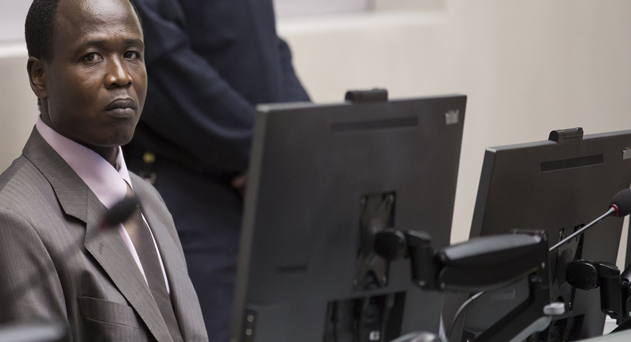
International Criminal Court Outreach Coordinator, Maria Kamara, with some of the victims in the Dominic Ongwen case during one of the public meetings.
Dominic Ong’wen’s trial for 70 crimes against humanity charges at the International Criminal Court (ICC) will not begin in Uganda, after all.
Prosecutors and defense counsel and victims’ legal representatives had suggested that opening statements in the case be presented in Gulu, northern Uganda, the scene of the atrocities committed by the Lord’s Assistant Army for which Ongwen has been charged. Trial Chamber IX rejected the request and also declined to authorize a court a site visit before hearing starts in December 2016.
Pre-Trial Chamber II last year confirmed all the 70 crimes against humanity and war crimes charges against Ong’wen. Although the judges acknowledged the importance of bringing justice closer to the affected communities, they nevertheless ruled that holding the opening statements of the trial in Uganda was not desirable, citing security concerns and logistical challenges.
“The Chamber considers that the combination of security concerns (including, as stated by the common legal representative of victims, with respect to Ong’wen’s prospective presence in Uganda and the victims’ ensuing fear of possible episodes of violence) and logistical difficulties (noting also the judicial workload of the Chamber’s individual Judges in other situations and cases before the Court) militates against making a recommendation to the Presidency to hold the opening of the trial in situ,” Presiding Judge Betram Schmitt said.
Trial Chamber IX also raised doubts about whether a judicial site visit to northern Uganda would be of material assistance to its evaluation of the evidence.
Although it is not cited as part of the decision, there are reports of the resurgence of LRA, which is said to have killed 100,000 people and abducted over 60, 000 since it was formed in the 1980s as a movement to oppose President Yoweri Museveni’s rule.
Ongwen’s former militia leader, Joseph Kony, is on the run since the ICC issued a warrant of arrest against him in 2005. It is said that Kony considers Ong’wen’s surrender to the US army in 2015 as an act of betrayal. Ong’wen served in LRA ranks for 30 years since his abduction as a 10-year-old boy, and rose to become a brigadier commanding some of the expeditions against his home villages.
After his surrender and arrest, Ong’wen was handed over to the ICC in 2015. The ICC Prosecutor has divided the charges against him into seven categories. Ong’wen faces a total of 45 counts of crimes against humanity and war crimes for attacks on four camps of people who were displaced from their homes in northern Uganda between 2002 and 2005. The camps attacked were Abok, Lukodi, Odek, and Pajule.
Additionally, Ong’wen is facing charges for sexual and gender-based crimes.
Although the Rome Statute, the treaty that founded the ICC, provides for in situ heatings and site visits, the court has so far not been able to employ their use.
Judges declined requests for in situ hearings in Kenya or Arusha, Tanzania, by Uhuru Kenyatta and William Ruto when they were facing crimes against humanity charges in connection with the post-2007 election violence. Judges declined to grant the requests citing concerns over witness intimidation and tampering.
Read: Victim and perpetrator: Why Ongwen’s case is a unique one







